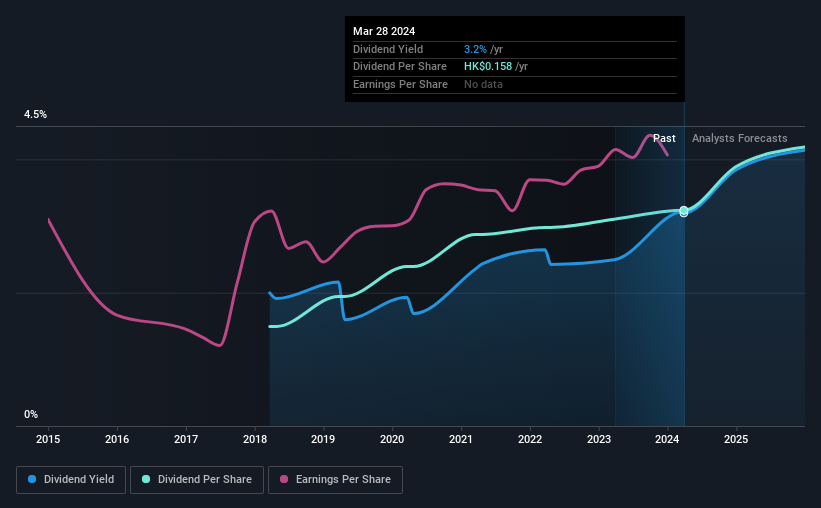Nissin Foods (HKG:1475) Will Pay A Larger Dividend Than Last Year At HK$0.1582

Nissin Foods Company Limited's (HKG:1475) dividend will be increasing from last year's payment of the same period to HK$0.1582 on 27th of June. This takes the annual payment to 3.2% of the current stock price, which unfortunately is below what the industry is paying.
See our latest analysis for Nissin Foods
Nissin Foods' Earnings Easily Cover The Distributions
Even a low dividend yield can be attractive if it is sustained for years on end. Prior to this announcement, Nissin Foods was quite comfortably covering its dividend with earnings and it was paying more than 75% of its free cash flow to shareholders. By paying out so much of its cash flows, this could indicate that the company has limited opportunities for investment and growth.
Over the next year, EPS is forecast to expand by 42.2%. If the dividend continues along recent trends, we estimate the payout ratio will be 40%, which is in the range that makes us comfortable with the sustainability of the dividend.

Nissin Foods Doesn't Have A Long Payment History
The dividend's track record has been pretty solid, but with only 6 years of history we want to see a few more years of history before making any solid conclusions. Since 2018, the dividend has gone from HK$0.073 total annually to HK$0.1582. This works out to be a compound annual growth rate (CAGR) of approximately 14% a year over that time. The dividend has been growing rapidly, however with such a short payment history we can't know for sure if payment can continue to grow over the long term, so caution may be warranted.
The Dividend Looks Likely To Grow
The company's investors will be pleased to have been receiving dividend income for some time. It's encouraging to see that Nissin Foods has been growing its earnings per share at 11% a year over the past five years. Earnings are on the uptrend, and it is only paying a small portion of those earnings to shareholders.
In Summary
In summary, while it's always good to see the dividend being raised, we don't think Nissin Foods' payments are rock solid. The low payout ratio is a redeeming feature, but generally we are not too happy with the payments Nissin Foods has been making. We would be a touch cautious of relying on this stock primarily for the dividend income.
Market movements attest to how highly valued a consistent dividend policy is compared to one which is more unpredictable. Meanwhile, despite the importance of dividend payments, they are not the only factors our readers should know when assessing a company. Companies that are growing earnings tend to be the best dividend stocks over the long term. See what the 4 analysts we track are forecasting for Nissin Foods for free with public analyst estimates for the company. Looking for more high-yielding dividend ideas? Try our collection of strong dividend payers.
Valuation is complex, but we're here to simplify it.
Discover if Nissin Foods might be undervalued or overvalued with our detailed analysis, featuring fair value estimates, potential risks, dividends, insider trades, and its financial condition.
Access Free AnalysisHave feedback on this article? Concerned about the content? Get in touch with us directly. Alternatively, email editorial-team (at) simplywallst.com.
This article by Simply Wall St is general in nature. We provide commentary based on historical data and analyst forecasts only using an unbiased methodology and our articles are not intended to be financial advice. It does not constitute a recommendation to buy or sell any stock, and does not take account of your objectives, or your financial situation. We aim to bring you long-term focused analysis driven by fundamental data. Note that our analysis may not factor in the latest price-sensitive company announcements or qualitative material. Simply Wall St has no position in any stocks mentioned.
About SEHK:1475
Nissin Foods
Manufactures and sells instant noodles in Hong Kong, Mainland China, Canada, Australia, the United States, Taiwan, Macau, and internationally.
Flawless balance sheet with proven track record.
Market Insights
Community Narratives




